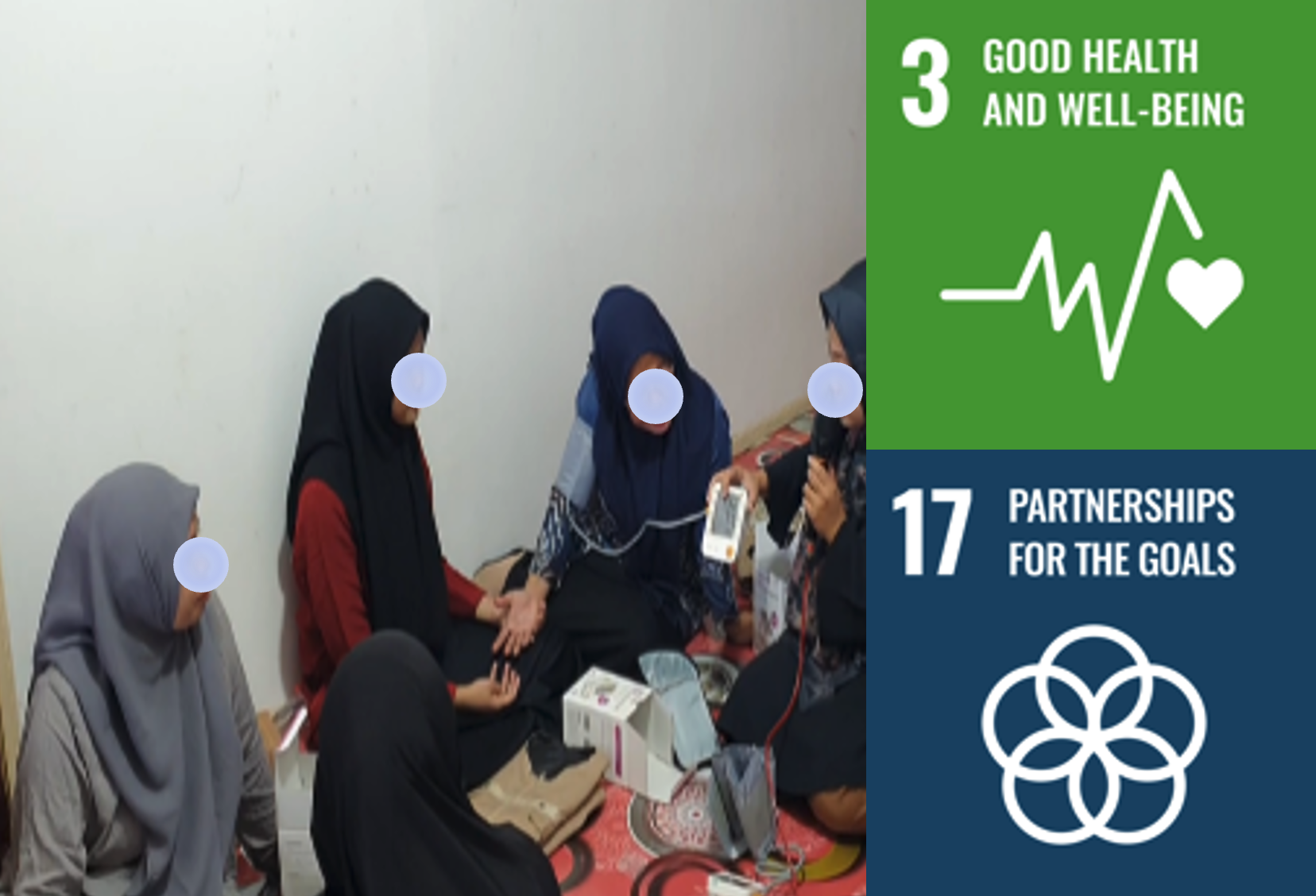Main Article Content
Abstract
Hypertension is a major health problem that requires continuous management, especially in areas with limited access to health services, such as Sungai Rangas Ulu Village. Limited public knowledge and a lack of health cadre skills in monitoring blood pressure are challenges in hypertension control. This community service activity aims to optimize the role of cadres in preventing hypertension. The training involved five cadres from toddler integrated health posts (posyandu) and five cadres from elderly integrated health posts (posyandu), with methods that included theoretical delivery on hypertension and its risk factors, as well as practical use of sphygmomanometers. The training results showed that 89% of cadres experienced a significant increase in knowledge and skills. Overall, this program successfully increased cadre capacity in blood pressure monitoring and health education, which is expected to contribute to more effective hypertension control in Sungai Rangas Ulu Village. Continued mentoring is needed to ensure program sustainability and long-term positive impact.
Keywords
Article Details

This work is licensed under a Creative Commons Attribution-NonCommercial 4.0 International License.
References
- Alnasir, F. A. L. (2008). Hypertension the Silent Killer: Part two. Journal of the Bahrain Medical Society, 20(3), 128–134.
- Andrianto, A., Ardiana, M., Nugraha, R. A., Yutha, A., Khrisna, B. P. D., Putra, T. S., Shahab, A. R., Andrianto, H., Kikuko, I. H., Puspitasari, A. N., & Hajjrin, M. R. (2022). Impact of the virtual anti-hypertensive educational campaign towards knowledge, attitude, and practice of hypertension management during the COVID-19 pandemic. World Journal of Cardiology, 14(12), 626–639. https://doi.org/10.4330/wjc.v14.i12.626
- Androulakis, E., Tousoulis, D., Papageorgiou, N., & Stefanadis, C. (2013). Biomarkers in essential hypertension. In Biomarkers in Cardiovascular Diseases (pp. 45–65).
- Aryanti, S., Wardani, D. W. S. R., Suwandi, J. F., Bakri, S., & Apriliani, A. P. (2023). Determinants of Hypertension Occurrence in Rural Areas of North Lampung Regency, Lampung Province, Indonesia Using Structural Equation Modeling (SEM) Analysis. Universal Journal of Public Health, 11(5), 716–723. https://doi.org/10.13189/ujph.2023.110521
- Bykowski, K. A. (2022). Management of primary hypertension in rural populations. Nurse Practitioner, 47(6), 30–37. https://doi.org/10.1097/01.NPR.0000829796.72770.72
- Chimberengwa, P. T., & Naidoo, M. (2019). A description of community-based participatory research of hypertension awareness, prevention and treatment in a district of Matabeleland South Province, Zimbabwe. African Journal of Primary Health Care and Family Medicine, 11(1). https://doi.org/10.4102/phcfm.v11i1.1839
- Dal Lin, C., Silvestro, M., Migliorini, R., Tona, F., & Fioranelli, M. (2017). Integrated approach to hypertension. In Integrative Cardiology: A New Therapeutic Vision (pp. 185–201). https://doi.org/10.1007/978-3-319-40010-5_15
- Dalfó-Pibernat, A., Dalfó Baqué, A., Pelegrina Rodríguez, F. J., Garin, O., Duran, X., Cladellas Capdevila, M., & Comin Colet, J. (2018). Improving ambulatory blood pressure monitoring knowledge in nurses and doctors: impact of a training intervention. European Journal of Cardiovascular Nursing, 17(8), 742–750. https://doi.org/10.1177/1474515118782100
- Filho, B. A. R., Farias, R. F., dos Anjos, W. E., & Monteiro, E. C. (2019). Evaluating the performance of automated sphygmomanometers using a patient simulator. Blood Pressure Monitoring, 24(6), 299–305. https://doi.org/10.1097/MBP.0000000000000395
- Gaciong, Z., & Symonides, B. (2010). Hypertension 2010: What was new for the cardiologist? Expert Opinion on Pharmacotherapy, 11(16), 2579–2597. https://doi.org/10.1517/14656566.2010.513972
- Goh, C.-L., & Nakatake, S. (2016). A sensor-based data visualization system for training blood pressure measurement by auscultatory method. IEICE Transactions on Information and Systems, E99D(4), 936–943. https://doi.org/10.1587/transinf.2015DAP0010
- Heydari, H., Sadeghi, R., Jamshidi, E., Rahimiforoushani, A., Nikbakht, H. A., & Mashhadsari, M. R. A. (2025). Effectiveness of community-based intervention using PATCH on disease perception, empowerment, and self-care in hypertension: a community trial protocol. Trials, 26(1). https://doi.org/10.1186/s13063-025-08743-8
- Irons, T. G., & Moore, K. S. (2015). The importance of health insurance and the safety net in rural communities. North Carolina Medical Journal, 76(1), 50–53. https://doi.org/10.18043/ncm.76.1.50
- Kaur, A., Dhoat, P. S., Kaur, N., & Sahoo, S. S. (2024). Knowledge, Awareness, and Determinants of Medication Adherence in Hypertensive Patients: A Hospital‑Based Cross‑sectional Study in North India. Journal of Pharmacy and Bioallied Sciences, 16, S118–S121. https://doi.org/10.4103/jpbs.jpbs_406_23
- Kooshki, A., & Hoseini, B. L. (2014). Phytochemicals and Hypertension. Shiraz E Medical Journal, 15(1). https://doi.org/10.17795/semj19738
- Le Jeune, S., Pointeau, O., Hube, C., Lopez-Sublet, M., Giroux-Leprieur, B., Dhote, R., & Mourad, J.-J. (2017). Usefulness of different techniques of blood pressure measurements in 2016. Revue de Medecine Interne, 38(4), 243–249. https://doi.org/10.1016/j.revmed.2016.09.018
- Leung, A. A., Bushnik, T., Hennessy, D., McAlister, F. A., & Manuel, D. G. (2019). Risk factors for hypertension in Canada. Health Reports, 30(2), 1–13.
- Li, Y., Li, F., Li, Y., Cui, X., Li, J., Zhi, H., Wang, W., Sun, Y., & Cui, W. (2020). Effect of cuff positioning on the accuracy of blood pressure measurement with automated electronic blood pressure monitors. Journal of Clinical Hypertension, 22(7), 1163–1172. https://doi.org/10.1111/jch.13902
- Liu, X., Slone, S. E., Chen, Y., Yeboah-Kordieh, Y., Alharthi, A., Amihere, J., Moyo-Songonuga, S., Lane, T., Ostchega, Y., Brady, T. M., Himmelfarb, C. R., & Commodore-Mensah, Y. (2024). Blood Pressure Measurements Obtained by Community-Dwelling Adults Are Similar to Nurse-Obtained Measurements: The SMART-BP Validate Study. American Journal of Hypertension, 37(5), 334–341. https://doi.org/10.1093/ajh/hpae001
- Mustaqimah, M., Lestari, Y. P., Anisa, F. N., Karinda, N. A., Evana, N. Q., Zulianur, R. A., Maharani, S. A., Saputri, R., Hakim, A. R., Diyanti, & Lestari, A. (2023). Pemberdayaan Kader Kesehatan Dalam Upaya Pengendalian Hipertensi Di Desa Sungai Batang Ilir RT.02. Majalah Cendekia Mengabdi, 1(4), 260–263. https://doi.org/10.63004/mcm.v1i4.300
- Nath, A., Shalini, M., & Mathur, P. (2021). Health systems challenges and opportunities in tackling non-communicable diseases in rural areas of India. National Medical Journal of India, 34(1), 29–35. https://doi.org/10.4103/0970-258X.323661
- Saputri, R., Holilah, S. N., Raudhatul Jannah, G., Amanah, N., Mustaqimah, M., & Hakim, A. R. (2024). Pemberdayaan Kader Kesehatan Desa Sungai Rangas Tengah Melalui Pemberian Pendidikan Tentang Hipertensi. Majalah Cendekia Mengabdi, 2(1), 51–55. https://doi.org/10.63004/mcm.v2i1.363
- Shrivastava, S. R., Shrivastava, P. S., & Ramasamy, J. (2014). The determinants and scope of public health interventions to tackle the global problem of hypertension. International Journal of Preventive Medicine, 5(7), 807–812.
- Wajngarten, M., & Sampaio Silva, G. (2019). Hypertension and stroke: Update on treatment. European Cardiology Review , 14(2), 111–115. https://doi.org/10.15420/ecr.2019.11.1
- Williams, H. (2015). Hypertension: Pathophysiology and diagnosis. Clinical Pharmacist, 7(1), 11–14.

